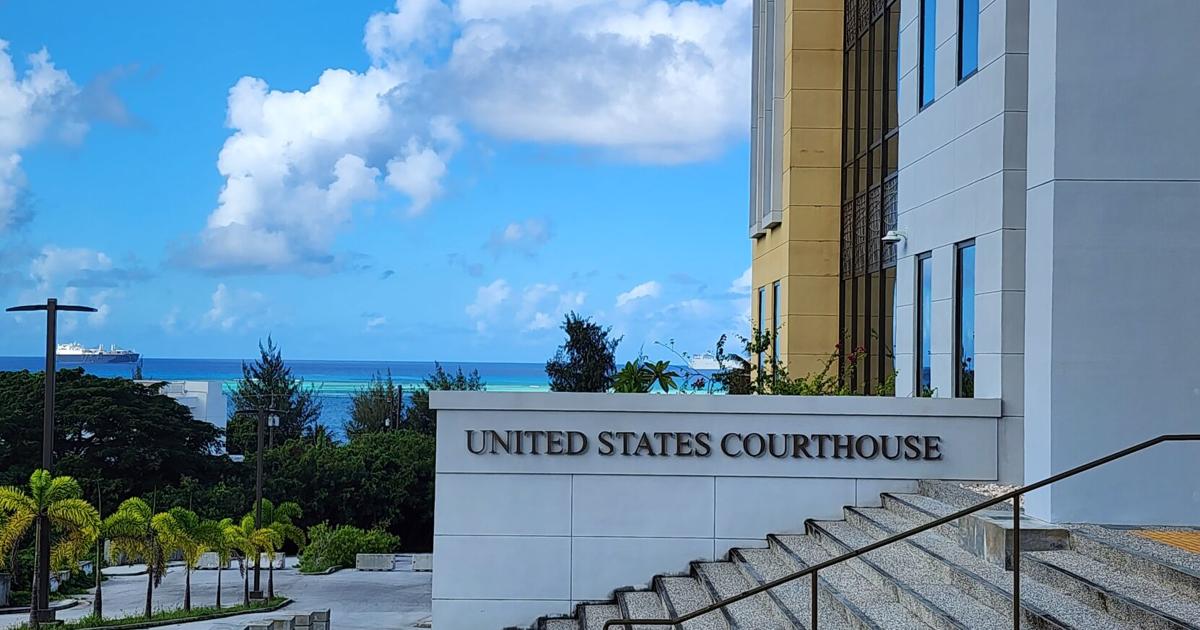The United States Courthouse in Gualo Rai, Saipan.
THE District Court for the NMI has granted in part and denied in part Marianas Consultancy Services and Alfred Yu’s motion to dismiss the U.S. government’s verified complaint for forfeiture regarding funds seized from two Bank of Saipan accounts in 2019.
In her order issued last month, Chief Judge Ramona V. Manglona also gave the U.S. Attorney’s Office for the Districts of Guam and the NMI leave to file an amended complaint.
Background
On Nov. 7, 2019, the Federal Bureau of Investigation executed search warrants at the Office of the Governor, casino investor Imperial Pacific International and the office of Alfred Yue of Marianas Consultancy Services LLC, among other offices. Marianas Consultancy Services LLC was a consultant for IPI.
In late 2022, the USAO for the Districts of Guam and the NMI sought the forfeiture of funds totaling $310,276.26 seized from two Bank of Saipan accounts for wire fraud and money laundering.
The USAO’s complaint was a civil forfeiture action and did not provide the name of any defendant, but referred to two bank accounts of “MCS” at Bank of Saipan.
According to the complaint, $271,087.88 was seized from “MCS account 1,” and $39,188.38 was seized from “MCS account 2.”
A resident of the CNMI, “A.Y.” is the sole owner and operator of MCS, the complaint added.
The seized funds are currently in the custody of the U.S. Department of the Treasury.
The complaint arises from an investigation by the Federal Bureau of Investigation and the U.S. Internal Revenue Service into a suspected conspiracy involving foreign entities, as well as entities and individuals in the CNMI, to commit wire fraud and money laundering.
“The suspected conspiracy involved the transfer of funds, including by international wire transfer, for the purpose of promoting two schemes to defraud: first, to promote the misrepresentation of material facts to, and the concealment of material information from CNMI regulatory authorities, in violation of Title 18, United States Code, Section 1343; and second, to illegally influence government officials in exchange for preferential treatment, thereby depriving the citizens of the CNMI of their intangible right to honest services of those CNMI government officials, in violation of Title 18, United States Code, Sections 1343 and 1346,” the complaint stated.
The suspected conspiracy involved a third scheme: “to evade the payment of the proper amount of income taxes owed to the CNMI government, in violation of Title 18, United States Code, Section 1343.”
According to the complaint, the “conspirators used international wire transfers made with the intent to promote the carrying on of any one or more of these wire fraud schemes, each of which constituted specified unlawful activity.”
“The wire transfers therefore constituted acts of international promotional money laundering,” the complaint added.
A.Y. incorporated MCS for the stated purpose of “banking and financial services, real estate development, and business management,” the complaint added.
In January 2023, District Court for the NMI Magistrate Judge Heather Kennedy issued a warrant of arrest in rem against the funds seized from the two Bank of Saipan accounts.
A warrant of arrest in rem is a legal order issued by a U.S. court that authorizes the seizure of property, rather than the arrest of a person.
Represented by attorney Mark Hanson, Marianas Consultancy Services and Alfred Yue filed a verified claim in federal court on Feb. 7, 2023, claiming ownership of funds seized from the two Bank of Saipan accounts totaling $310,276.26.
Hanson said Marianas Consultancy Services is the beneficial owner of the bank accounts from which the property was seized and the beneficial owner of all the property seized from those two bank accounts.
Hanson asked the federal court to dismiss the verified complaint for forfeiture in rem.
Forfeiture in rem refers to a legal process in which property is seized because it is connected to illegal activity, rather than targeting an individual.
Hanson said the “complaint fails to allege any viable predicate criminal offense that would provide grounds to forfeit defendant’s property (fund), in whole or in part, as either proceeds of any specified unlawful activity or as an instrument of international promotional money laundering.”
Ruling
Judge Manglona said because “the complaint does not sufficiently allege that the object of Scheme 1 was to deprive the Commonwealth Casino Commission of its money or property, Scheme 1 is not a violation of the federal wire fraud statute. Accordingly, Scheme 1 does not constitute specified unlawful activity and cannot support forfeiture under international promotional money laundering forfeiture or proceeds money laundering forfeiture.”
However, Judge Manglona said Scheme 2 in the complaint supports forfeiture on the grounds of international promotional money laundering and honest services fraud.
She said Scheme 2 sufficiently alleges the requisite quid pro quo bribery for honest services fraud.
“Thus, understanding that claimants will receive additional identifying information in discovery materials, the complaint sufficiently alleges information about the identity of the public officials to survive dismissal,” the judge added.
As for Scheme 3, defrauding the CNMI of tax revenue, Judge Manglona said the complaint does not support forfeiture.
“Here, the complaint only states the use of foreign wires in China to execute Scheme 3, and thus it lacks the jurisdictional requirement for wire fraud,” the judge said.
The U.S. government has argued that “it is reasonable to infer that there were other domestic wire communications that prompted the overseas bank transfers.”
However, this is an unwarranted leap based on the facts at hand, the judge said.
“As such, the court agrees that the complaint fails to allege the jurisdictional element required for wire fraud as to Scheme 3. Because Scheme 3 does not constitute wire fraud, it cannot serve as the specified unlawful activity for the United States’ international promotional money laundering forfeiture claim,” Judge Manglona added.
On April 11, 2025, the USAO filed an amended complaint of forfeiture in rem, and filed for another application for warrant of arrest in rem.


